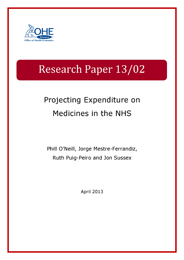Unlocking the Value of Combination Therapies



Medicines account for less than 10% of total NHS expenditure in the UK. Because spending on medicines is easy to separate out, however, this sector continues to come under particular scrutiny in efforts to manage costs. Forecasting spending on medicines…

Medicines account for less than 10% of total NHS expenditure in the UK. Because spending on medicines is easy to separate out, however, this sector continues to come under particular scrutiny in efforts to manage costs. Forecasting spending on medicines can be useful in planning NHS resource allocation.

Medicines account for less than 10% of total NHS expenditure in the UK. Because spending on medicines is easy to separate out, however, this sector continues to come under particular scrutiny in efforts to manage costs. Forecasting spending on medicines can be useful in planning NHS resource allocation. Simple extrapolations of past trends in medicines expenditure, however, are insufficient because they cannot account for shifts in the mix of medicines available on the market or the appearance of generics.
Most projections of medicines spending are rooted in the past and are “top-down”, macro-based approaches. Such models are based on econometric analyses of past spending trends, actuarial estimates of future population changes, assumptions about growth in GDP, projected changes in prescribing trends, and estimates of the impact of any major changes in the legal or regulatory environment that will affect health care services. These models cannot anticipate changes in the mix of medicines available.
OHE has just completed a new study that projects medicines expenditure in the UK to 2015 using a product-level, or “bottom-up”, approach. This makes it possible to base forecasts on what is most likely to change in the medicines market, e.g. the appearance of new products and the debut of new generics and biosimilars. With that objective in mind, the OHE sought input from a number of experts, primarily from pharmaceutical companies, to better understand trends in the evolution of therapeutic areas that account for about 80 percent of spending. This also allowed us to understand whether and how well historic trends approximate future trends.
The calculations in this study also differ from other estimates by using regression analyses of data drawn directly from experience to date in the UK—for example in estimating changes caused by the appearance of generic versions of prescription medicines and the rate of uptake of new medicines. The model developed in this study can be used to gauge the effects of any number of potential scenarios, providing another tool for forecasters.
The study compares the results for forecasting medicine expenditures using a top-down analysis and OHE’s bottom-up approach. This shows that the bottom-up approach provides richer detail about causes and distribution of costs, i.e. which therapeutic areas may consume the greater resources. Such detail offers an opportunity, in theory at least, for policy makers to make better-informed decisions—both about allocating resources and about policies that can influence the factors that, in turn, determine medicines expenditures.
The table below shows our top-line results, as ranges, for the total market and the branded segment.
| Compound Annual Growth Rates |
2011 – 2015e |
| Total market |
3.1% – 4.1% |
| Total branded segment |
0.5% – 1.8% |
As the paper was being finalised, data for 2012 became available from IMS, which allowed us to compare the study’s projected growth rates for 2012 with actual rates. These were within the ranges shown above.
Download O'Neill, P., Mestre-Ferrandiz, J., Puig-Peiro, R. and Sussex, J. Projecting Expenditure on Medicines in the NHS. Research Paper 13/02. London: Office of Health Economics. Editor's notes: This study has been published as O’Neill, P., Mestre-Ferrandiz, J., Puig-Peiro, R. and Sussex, J. (2013) Projecting expenditures on medicines in the UK NHS. PharmacoEconomics. 31(10), 933-957. An expanded version of this study, with analyses through the end of 2018, was completed by OHE in 2014 and is available for download.
For additional information, please contact Jorge Mestre-Ferrandiz.
An error has occurred, please try again later.
This website uses cookies so that we can provide you with the best user experience possible. Cookie information is stored in your browser and performs functions such as recognising you when you return to our website and helping our team to understand which sections of the website you find most interesting and useful.
Strictly Necessary Cookie should be enabled at all times so that we can save your preferences for cookie settings.
If you disable this cookie, we will not be able to save your preferences. This means that every time you visit this website you will need to enable or disable cookies again.
This website uses Google Analytics to collect anonymous information such as the number of visitors to the site, and the most popular pages.
Keeping this cookie enabled helps us to improve our website.
Please enable Strictly Necessary Cookies first so that we can save your preferences!
